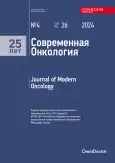Prognostic significance of androgen receptor expression in triple-negative breast cancer
- Authors: Panchenko I.S.1,2, Panchenko S.V.1,2, Sharafutdinov M.G.1, Rodionov V.V.3, Kometova V.V.3, Burmenskaya O.V.3
-
Affiliations:
- Ulyanovsk State University
- Regional Clinical Oncologic Dispensary
- Kulakov National Medical Research Center for Obstetrics, Gynecology and Perinatology
- Issue: Vol 26, No 4 (2024)
- Pages: 426-430
- Section: Articles
- URL: https://journals.rcsi.science/1815-1434/article/view/280722
- DOI: https://doi.org/10.26442/18151434.2024.4.202919
- ID: 280722
Cite item
Full Text
Abstract
Background. Determining androgen receptor (AR) expression in triple-negative breast cancer (TNBC) is a promising tool in oncology.
Aim. To identify the correlation of AR expression with the clinical and genetic characteristics of the tumor and the disease prognosis.
Materials and methods. The study included 246 subjects with TNBC treated at Ulyanovsk Regional Oncological Clinical Dispensary and Kulakov National Medical Research Center for Obstetrics, Gynecology, and Perinatology (Moscow) from 2014 to 2024. The AR expression was determined by immunohistochemical method in all patients. Clinical (age, primary tumor size, number of regional lymph nodes affected, total malignancy score) and genetic (expression level of 44 genes expressed on the ln-scale) tumor parameters were analyzed. Parametric (Student's t-test) and non-parametric (one-way ANOVA) statistical methods were used to evaluate the relationship between AR expression and clinical genetic parameters. An overall survival analysis was performed using Kaplan–Meier curves to determine the prognosis.
Results. A log-rank test was used when comparing survival curves. Differences between groups were considered statistically significant at p<0.05. AR expression is associated with elderly age, metastatic lesions of regional lymph nodes, with the expression of CTSL2, AURKA, KRT5, CCND1, BCL2, FGFR4, TMEM45A, MiKI67, MYBL2, CDKN2A, FOXA1, SFRP1, PTEN, CD68, EMSY, GATA3, EXO1, PPP2R2A, TPX2, PAK1, PTTG1, UBE2T, KIF14, CCNB1, BAG1, TMEM45B, MYC, MIA, BIRC5, PD-L1, TRAC, ZNF703, TYMS, CCNE, ANLN and poor long-term prognosis in TNBC.
Conclusion. TNBC with AR expression is a heterogeneous subtype. It is associated with advanced age, metastatic involvement of regional lymph nodes, and expression of a large number of genes. According to our data, AR expression in TNBC is associated with unfavorable long-term prognosis of this category of patients.
Full Text
##article.viewOnOriginalSite##About the authors
Ivan S. Panchenko
Ulyanovsk State University; Regional Clinical Oncologic Dispensary
Author for correspondence.
Email: pan91ch@yandex.ru
ORCID iD: 0000-0001-7923-4317
SPIN-code: 3171-5174
Assistant
Russian Federation, Ulyanovsk; UlyanovskSergei V. Panchenko
Ulyanovsk State University; Regional Clinical Oncologic Dispensary
Email: pan91ch@yandex.ru
ORCID iD: 0000-0002-9006-2023
SPIN-code: 6140-6733
Cand. Sci. (Med.)
Russian Federation, Ulyanovsk; UlyanovskMarat G. Sharafutdinov
Ulyanovsk State University
Email: pan91ch@yandex.ru
ORCID iD: 0000-0002-8782-4111
SPIN-code: 4904-0615
Cand. Sci. (Med.)
Russian Federation, UlyanovskValerii V. Rodionov
Kulakov National Medical Research Center for Obstetrics, Gynecology and Perinatology
Email: pan91ch@yandex.ru
ORCID iD: 0000-0003-0096-7126
SPIN-code: 2716-7193
D. Sci. (Med.)
Russian Federation, MoscowVlada V. Kometova
Kulakov National Medical Research Center for Obstetrics, Gynecology and Perinatology
Email: pan91ch@yandex.ru
ORCID iD: 0000-0001-9666-6875
SPIN-code: 2390-4253
ResearcherId: AAH-4161-2020
Cand. Sci. (Med.)
Russian Federation, MoscowOlga V. Burmenskaya
Kulakov National Medical Research Center for Obstetrics, Gynecology and Perinatology
Email: pan91ch@yandex.ru
ORCID iD: 0000-0003-2842-3980
SPIN-code: 7771-6064
D. Sci. (Biol.)
Russian Federation, MoscowReferences
- Li X, Yang J, Peng L, et al. Triple-negative breast cancer has worse overall survival and cause-specific survival than non-triple-negative breast cancer. Breast Cancer Res Treat. 2017;161(2):279-87. doi: 10.1007/s10549-016-4059-6
- Kennecke H, Yerushalmi R, Woods R, et al. Metastatic behavior of breast cancer subtypes. J Clin Oncol. 2010;28(20):3271-7. doi: 10.1200/JCO.2009.25.9820
- Grasset EM, Dunworth M, Sharma G, et al. Triple-negative breast cancer metastasis involves complex epithelial-mesenchymal transition dynamics and requires vimentin. Sci Transl Med. 2022;14(656):eabn7571. doi: 10.1126/scitranslmed.abn7571
- Astvatsaturyan K, Yue Y, Walts AE, Bose S. Androgen receptor positive triple negative breast cancer: Clinicopathologic, prognostic, and predictive features. PLoS One. 2018;13(6):e0197827. doi: 10.1371/journal.pone.0197827
- Burstein MD, Tsimelzon A, Poage GM, et al. Comprehensive genomic analysis identifies novel subtypes and targets of triple-negative breast cancer. Clin Cancer Res. 2015;21(7):1688-98. doi: 10.1158/1078-0432.CCR-14-0432
- Grellety T. Cancer du sein triple négatif exprimant le récepteur aux androgènes: de la biologie à la thérapeutique [Androgen receptor-positive triple negative breast cancer: From biology to therapy]. Bull Cancer. 2020;107(4):506-16 [French]. doi: 10.1016/j.bulcan.2019.12.012
- Choi JE, Kang SH, Lee SJ, Bae YK. Androgen receptor expression predicts decreased survival in early stage triple-negative breast cancer. Ann Surg Oncol. 2015;22(1):82-9. doi: 10.1245/s10434-014-3984-z
- Bonnefoi H, Grellety T, Tredan O, et al. A phase II trial of abiraterone acetate plus prednisone in patients with triple-negative androgen receptor positive locally advanced or metastatic breast cancer (UCBG 12-1). Ann Oncol. 2016;27(5):812-8. doi: 10.1093/annonc/mdw067
- Kometova V, Panchenko I, Rodionov V, et al. The scale of androgen expression in triple negative breast cancer. Abstracts 29-th European Congress of Pathology: Pathology for Patient Care. – RAI Amsterdam, The Netherlands, 02.09–06.09.2017. – PS-01-018 (S54). Virchows Arch. 2017;471(Suppl. 1):68-9.
- Luo X, Shi YX, Li ZM, Jiang WQ. Expression and clinical significance of androgen receptor in triple negative breast cancer. Chin J Cancer. 2010;29(6):585-90. doi: 10.5732/cjc.009.10673
- Pistelli M, Caramanti M, Biscotti T, et al. Androgen receptor expression in early triple-negative breast cancer: clinical significance and prognostic associations. Cancers (Basel). 2014;6(3):1351-62. doi: 10.3390/cancers6031351
- Gasparini P, Fassan M, Cascione L, et al. Androgen receptor status is a prognostic marker in non-basal triple negative breast cancers and determines novel therapeutic options. PLoS One. 2014;9(2):e88525. doi: 10.1371/journal.pone.0088525
- Qiu P, Guo Q, Yao Q, et al. Hsa-mir-3163 and CCNB1 may be potential biomarkers and therapeutic targets for androgen receptor positive triple-negative breast cancer. PLoS One. 2021;16(11):e0254283. doi: 10.1371/journal.pone.0254283
- Wang Y, Hacking SM, Li Z, et al. Triple-negative Breast Carcinoma With Apocrine and Histiocytoid Features: A Clinicopathologic and Molecular Study of 18 Cases. Am J Surg Pathol. 2023;47(9):1011-8. doi: 10.1097/PAS.0000000000002073
- Guiu S, Charon-Barra C, Vernerey D, et al. Coexpression of androgen receptor and FOXA1 in nonmetastatic triple-negative breast cancer: ancillary study from PACS08 trial. Future Oncol. 2015;11(16):2283-97. doi: 10.2217/fon.15.102
- Chartier S, Brochard C, Martinat C, et al. TROP2, androgen receptor, and PD-L1 status in histological subtypes of high-grade metaplastic breast carcinomas. Histopathology. 2023;82(5):664-71. doi: 10.1111/his.14852
Supplementary files








